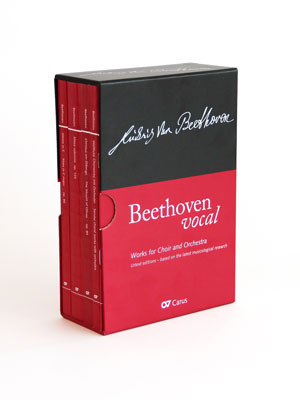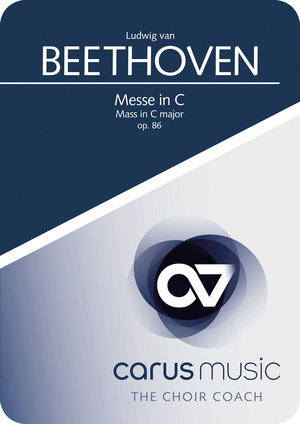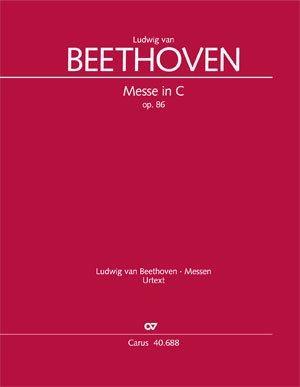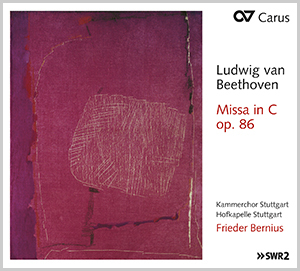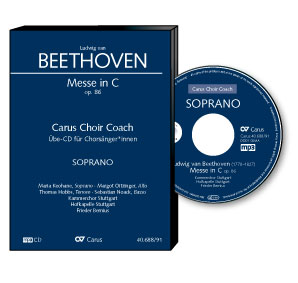
The first of Beethoven’s two Mass settings is distinctly modern and innovative in its musical language, which is both subjective and fervent. With its dramatic alternation of vocal and instrumental passages, and great contrasts in tension and expression, the Mass constantly demands the highest concentration and accuracy from the choral singers.
The Carus Choir Coach offers choir singers the unique opportunity to study and learn their own, individual choral parts within the context of the sound of the entire choir and orchestra. For every vocal range a separate Audio CD or MP3 and download containing each choir part is available. The Carus Choir Coach is based on recorded interpretations by renowned artists who have performed the work from carefully prepared Carus Urtext editions. Each choir part is presented in three different versions:
- Original recording
- Coach: each part is accompanied by the piano, with the original recording sounding in the background
- Coach in slow mode: the tempo of the coach slows down to 70% of the original version – through this reduction passages can be learned more effectively.
Performers: Maria Keohane (Sopran), Margot Oitzinger (Alt), Thomas Hobbs (Tenor), Sebastian Noack (Bass) – Kammerchor Stuttgart, Hofkapelle Stuttgart – Frieder Bernius
Contents
-
Composer
Ludwig van Beethoven
| 1770-1827Ludwig van Beethoven was without doubt one of the most influential composers in the history of music. His works formed the culmination of many genres – particularly instrumental – of Viennese classicism, and laid the foundation for the following decades. But Beethoven’s vocal works set standards too: the late Missa Solemnis is one of the most impressive choral works of its time; but his earlier Mass in C also opens up new worlds of expression for the liturgical text, and set the benchmark for the further development in the composition of the mass. And with the final chorus of the Ninth Symphony, the setting of Schiller’s Ode to Joy, Beethoven created one of the most frequently-performed and best known choral pieces of all, writing a timeless musical memorial to himself. Personal details
-
Choir
Kammerchor Stuttgart
The Kammerchor Stuttgart is regarded as one of the best ensembles of its kind. Over its fifty-year existence, Frieder Bernius has developed the choir into an exceptional ensemble acclaimed by audiences and press alike. This has led to invitations for the choir to perform at all the important European festivals. In Germany the chamber choir performs at festivals and in concert halls in repertoire ranging from the 17th to the 21st century. Frieder Bernius and his ensemble have received numerous accolades for their contribution to new music. The Kammerchor Stuttgart has made over 80 CDs and LPs, numerous of which have been awarded international recording prizes (including the Edison award, Diapason d’or, Gramophone Choice, Classical Internet Award, International Classical Music Award, and German Record Critics’ Award prizes). The International Federation for Choral Music has invited the ensemble to sing at the 1st, 4th and 10th World Symposia on Choral Music in Vienna, Sydney and Seoul. Regular tours of North America and Asia since 1988 and a South America tour reflect the Kammerchor Stuttgart’s international reputation. Since 1984 the top ensemble has also been invited to Israel biennially. Personal details
-
Ensemble
Hofkapelle Stuttgart
The Hofkapelle Stuttgart, founded in 2006 by Frieder Bernius to complement the Barockorchester Stuttgart, concentrates on repertoire from the 19th century performed on authentic instruments. One of its main focusses is the rediscovery of music-historical treasures, particularly works from the south-west German region (by composers such as Kalliwoda, Knecht and Holzbauer). The Hofkapelle and Barockorchester Stuttgart regularly perform at international festivals (Rome, Salzburg, Göttingen, Dresden, etc.). CDs made by both groups have received many awards: the Missa Dei Patris by Jan Dismas Zelenka was nominated for the Cannes Classical Award, and the Incidental Music to Shakespeare’s Ein Sommernachtstraum [A Midsummer Night’s Dream] by Felix Mendelssohn Bartholdy was featured by Rondo magazine and awarded the Star of the Month prize by Fono Forum magazine. Mozart’s Requiem received the Diapason d’or de l’année 2003, Johann Gottlieb Naumann’s opera Aci e Galatea was named opera recording of the year in Opernwelt magazine and Bach’s Easter Oratorio included in the Quarterly Critics’ Choice of the German Record Critics’ Award. The group’s recording of Bach’s B Minor Mass was Editor’s Choice in Gramophone magazine. Personal details
-
Conductor
Frieder Bernius
| 1947Frieder Bernius’s work has earned great worldwide recognition. He is in demand internationally as a conductor and as a teacher. His principal artistic collaborators are the ensembles he founded himself, the Kammerchor Stuttgart, the Barockorchester Stuttgart, the Hofkapelle Stuttgart and the Klassische Philharmonie Stuttgart. As a guest conductor, he has collaborated repeatedly with, for example, the SWR Vokalensemble Stuttgart, the Deutsche Kammerphilharmonie Bremen, the Stuttgarter Kammerorchester and the Streicherakademie Bozen. Great stylistic versatility is Frieder Bernius’s hallmark. Whether he conducts vocal works by Monteverdi, Bach, Händel, Mozart, Beethoven, Fauré and Ligeti, stage music by Mendelssohn or symphonies by Haydn, Burgmüller and Schubert, his work always aims for a sound that is at once unmistakably personal and at the same time oriented towards the original period sound ideal. He devotes himself equally to the rediscovery of 18th century operas and to first performances of contemporary compositions. He is particularly interested in the musical history of southwestern Germany. Carus-Verlag has awarded Frieder Bernius a Golden CD for his complete recording of the sacred music of Felix Mendelssohn Bartholdy. The award was presented to him during the German Choir Festival in Stuttgart 2016. The sale of over 250,000 recordings, which has been acclaimed with a number of awards, has made a not insignificant contribution to what today is the obvious presence of Mendelssohn's complete œuvre in the concert repertoire. Personal details
-
Soloist - soprano
Maria Keohane
Maria Keohane is a Swedish soprano whose repertoire spans a wide spectrum of music styles from baroque to contemporary, including chamber music, opera and oratorios. She has performed in Claudio Monteverdi’s Il Ritorno d’Ulisse in Patria with Gothenburg Theatre, Peri’s Euridice with Drottningholm Court Theatre, and in Verdi’s Don Carlos with The Royal Danish Theatre in Copenhagen. She has sung Brahms’ Requiem at the Gothenburg Concert hall, Bach’s Wedding Cantata with Philharmonia Baroque Orchestra in San Francisco and Handel’s Il Trionfo del Tempo e del Disinganno with Concerto Copenhagen at Wiener Konzerthaus. Maria Keohane is frequently engaged as an oratorio soloist and has appeared as a soloist at arenas including Tanglewood, Concertgebouw in Amsterdam, Halle Handel Festspiele and Edinburgh Festival with conductors such as Jerome Correas, Eric Ericson, Martin Gester, Gustav Leonhardt, Andrew Manze, Nicholas McGegan, Lars Ulrik Mortensen, Andrew Parrott, Stephen Stubbs, Jos van Veldhoven, and Christopher Warren-Green. Personal details
-
Soloist - alto
Margot Oitzinger
Margot Oitzinger was born in Graz and studied singing at the University of Music and Performing Arts in her hometown. She also participated in sever - al master classes with Emma Kirkby and Peter Kooij. She was a prizewinner at the International Johann- Sebastian-Bach competition in Leipzig 2008 and at the International baroque singing competition in Chimay (Belgium) 2006. Her repertoire ranges from the works of Bach and Handel, with an emphasis on oraatrios, via Mozart and Haydn, up to music of the romantic and modern eras. As a soloist she has performed with ensembles such as the Collegium Vocale Gent, the Bach Collegium Japan, Concerto Copenhagen, L’Orfeo Barockorchester, the Wiener Akademie, the Bach Consort, Le Concert Lorrain, Sette voci, the Dunedin Consort, and many others. Apart from numerous chanson and Lieder recitals, and at the Festival Crete Senesi, she has also performed many operatic roles – especially from the Ba - roque era – at the Kammeroper Graz, Kammeroper Vienna, at the Donaufestwochen in Greinburg Castle and at the Styriarte. Margot Oitzinger performs at many international festivals and can be heard on numerous CD recordings. Personal details
-
Soloist - tenor
Thomas Hobbs
In the course of his short career, the young English tenor Thomas Hobbs has already earned consider - able esteem. Still as a student, he was was awarded numerous prizes and scholarships. In addition to developing his solo career, Hobbs has sung in some of England’s leading vocal ensembles, such as The Cardinall’s Musick, The Tallis Scholars, I Fagiolini, and The Sixteen. In the genre of opera, he has performed Acis and other roles in Handel’s Acis and Galathea, Ferrando in Cosi fan tutte and, most recently, the title role in Britten’s Albert Herring at the Royal Academy Opera. During the 2010/11 season he made his debut at the English National Opera in Monteverdi’s Il ritorno d'Ulisse. Thomas Hobbs regularly gives Lieder recitals; his repertoire in cludes Vaughan- Williams’s On Wenlock Edge as well as Schubert’s Die schöne Müllerin and Schumann’s Liederkreis. He is also much in demand as a concert soloist. In 2009, he participated in the Academy of the Festival Aix-en-Provence and performed with the Camerata Salzburg under Louis Langrée. Personal details
-
Soloist - bass
Sebastian Noack
The baritone Sebastian Noack was born in Berlin and studied singing with Dietmar Hackel, Ingrid Figur and Dietrich Fischer-Dieskau. He became known after being awarded 1st prize at the Bundeswettbewerb Gesang; other prizes followed. Since then he has made a name for himself, particularly as a concert singer, performing under renowned conductors such as Frieder Bernius, Marcus Creed, Christoph Eschenbach, and Roy Goodman. His repertoire includes all of the significant oratorios from the Renaissance to the present time. On numerous tours he has travelled through all of Europe, the USA and Southeast Asia. He is a welcome guest at international festivals. Noack sings with the large broadcasting networks and well-known Baroque orchestras as well as with chamber music ensembles, e.g., the Sharoun Ensemble or Sabine Meyer’s Trio di Clarone. He has participated in CD productions under Philippe Herreweghe and Andreas Spering. Noack is particularly interested in lieder. Together with the pianist Manuel Lange, he founded the new concert series “Meisterlied im Musikinstrumenten-Museum”, for which – in addition to his own recitals – he has already been able to engage renowned guests. After having previ - ously performed concertante or semi-scenic operas, Noack made his stage debut in Donizetti’s Viva la Mamma at the Berlin State Opera in June 2009. He is a visit ing professor at the Hochschule für Musik Hanns Eisler in Berlin. Personal details
Frequent questions about this work
 There are no questions and answers available so far or you were unable to find an answer to your specific question about this work? Then click here and send your specific questions to our Customer Services!
There are no questions and answers available so far or you were unable to find an answer to your specific question about this work? Then click here and send your specific questions to our Customer Services!


